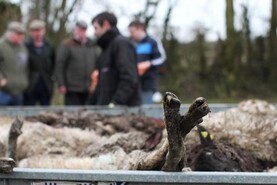The Irish Farmers’ Association (IFA) president Tim Cullinan has said the Government must implement a new scheme for tillage farmers to stop the exodus from this sector.
The IFA has put forward its requests for Budget 2022 at its annual pre-Budget lobby day.
It has called for the renewal of the Young Trained Farmer Stamp Duty Relief post-2021, which it claims is needed to encourage farm transfer and generational renewal.
It is seeking co-financing to ensure that Pillar II schemes such as Areas of Natural Constraint (ANCs); Green Low-Carbon Agri-Environmental Scheme (GLAS); Targeted Agricultural Modernisation Scheme (TAMS); Beef Data and Genomics Programme (BDGP – suckler cows); the Sheep Welfare Scheme and Organic Farming Scheme are properly funded.
The IFA is seeking €300 per suckler cow, €30 per ewe and €300m for ANCs.
It has requested accelerated capital allowances and VAT exemptions on the purchase of emissions-efficient investment, which will help farmers to play their role in contributing to the sector’s climate change targets.
IFA farm business committee chair Rose Mary McDonagh said: “We need significant taxation supports, in particular through investment in emissions-efficient equipment and the removal of discrimination in our tax system for the self-employed.”
IFA rural development chair Michael Biggins said farm schemes must remain a central part of Government policy, particularly for the low-income dry stock sector.
“Direct payments are a huge part of family farm incomes,” he said. “Targeted schemes are increasingly important. Expenditure on TAMS is currently behind target, with approximately 60% of the revised allocation of €523m spent to date.
“There needs to be increased flexibility along with the inclusion of additional qualifying investments to ensure all funding is drawn down,” he added.
Cullinan commented: “Farmers across all sectors are facing an increasingly uncertain future.
“Increasing regulation, Brexit-related trade disruption, the prospect of substantial cuts in direct payments due to CAP reforms, climate action measures and rising input costs means Irish farming is in a perilous position,” he said.
“The Government gave a clear commitment that it would ringfence €1.5bn of carbon tax receipts for an agri-environment scheme, referred to in the Programme for Government as 'REPS-2'.”






 This is a subscriber-only article
This is a subscriber-only article









SHARING OPTIONS: